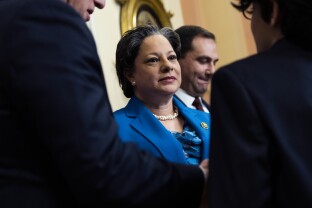Housing advocates are scrambling to figure out just how much their constituencies will be affected by the federal funding freeze the Trump administration is pursuing.
Millions of people rely on the more than $70 billion that is funneled through the Department of Housing and Urban Development — including through grants that provide Section 8 housing vouchers, homelessness assistance and much more — and how dramatic the shakeup could be after the Trump administration reviews federal spending is unclear.
The freeze was temporarily blocked by a federal judge just as it was set to go into effect Tuesday, but its future is still uncertain. The White House also tried on Tuesday to walk back the extent of the freeze by arguing that aid “provided directly to individuals” would not be affected. But that provided little assurance to Democrats, who say HUD assistance is rarely so straightforward.
“Most grants don’t go directly to individuals. Most grants go through either a state agency, a local government or a nonprofit,” Rep. Jennifer McClellan told NOTUS. “And so what they’re saying is hiding the scope of the problem.”
Rep. Emanuel Cleaver, the ranking member of the House Subcommittee on Housing and Insurance, said his phone didn’t stop ringing Tuesday as confused housing organizations sought answers.
“They wanted us to clear it up, and we could not clear it up,” Cleaver told NOTUS. “The president has conceivably created massive problems in the housing sector.”
Housing advocates are already wary of how the Trump administration will use Housing and Urban Development to deliver on the rest of his agenda. Scott Turner, Trump’s nominee to head the agency, has not been confirmed but is on track to get a floor vote — though many in the housing space know little about Turner, who was reluctant to commit to expanding HUD’s budget in his confirmation hearing.
The White House did not respond to a request for comment on which programs it was trying to include in its federal aid freeze or how HUD operations would change as it reviewed funding.
Many nonprofits focused on housing were reluctant to comment on the freeze, largely because of how fluid the situation was and how little they knew. But it was clear they were closely watching what would happen next.
“Even a short pause in funding could cause significant harm to low-income families and their communities,” said Renee M. Willis, interim president of National Low Income Housing Coalition, in a statement. “The longer the freeze continues, the greater the risk that low-income households receiving federal rental assistance could face eviction, and in the worst cases, homelessness, homeless shelters may be forced to close their doors, and nonprofit organizations may have to lay off staff.”
But it was clear that concerns ranged for a variety of constituencies, including veterans.
“If [organizations] don’t have the federal funding that they need, the work stops,” Victor LaGroon, former Department of Veterans Affairs chief diversity officer, told NOTUS. “That means those veterans stay on the streets or those veterans end up going onto the streets. And this is a big part of where many people, many organizations were concerned.”
For Democrats, housing quickly became part of the messaging pushback, with Sen. Tina Smith even arguing that the Low Income Home Energy Assistance Program was “life or death” for many of her Minnesota constituents.
Sen. Elizabeth Warren, the ranking member of the Senate Banking, Housing and Urban Affairs Committee, told reporters on Tuesday that her office was also receiving a lot of feedback about the proposed freeze.
“I’m hearing from nonprofits who don’t know if they can go on with their work,” Warren said. “We’ve got a group in Massachusetts that receives some federal funding to help homeless veterans transition into housing, and we’re not sure if they get funding, either.”
—
Amelia Benavides-Colón is a NOTUS reporter and an Allbritton Journalism Institute fellow. Torrence Banks and Margaret Manto contributed reporting.
Sign in
Log into your free account with your email. Don’t have one?
Check your email for a one-time code.
We sent a 4-digit code to . Enter the pin to confirm your account.
New code will be available in 1:00
Let’s try this again.
We encountered an error with the passcode sent to . Please reenter your email.


